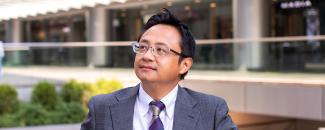What is your role as a governance professional?
‘I have been working in a licensed bank in Hong Kong as Fraud Control Officer and Head of Operational Risk Management for 10 years. My team and I represent the first and second lines of defense for risk management at the bank, a subsidiary of a top-tier Mainland banking group. My primary responsibility is to identify, monitor and report operational risk exposures relating to people, processes, systems and external sources.’
What was your career path to your current role?
‘After graduating in business and economics, I started my career in financial auditing and pursued my postgraduate degree and professional designation in accounting at the same time. Working in a professional services firm, I got valuable career experience in many areas of governance. I then moved to banking. I took the qualification exams of The Hong Kong Institute of Chartered Secretaries (the Institute), advanced my knowledge in areas including compliance, law and company secretaryship. Most importantly, studying for the Institute’s qualification broadened my insights into corporate governance, which is key to every aspect of business. Some people have deliberate, well-planned career paths, while others take it one job at a time. Either approach, or a combination of the two, can be successful, but my advice would be to be flexible and to be open to making lateral moves while keeping your ultimate goals in mind.’
What value does governance bring to organisations and to wider society?
‘Strong and effective corporate governance cultivate a company culture of integrity, leading to positive performance and an overall sustainable business. Essentially, it exists to increase the accountability of all individuals and teams within the company, working to avoid mistakes before they occur. When a company has solid corporate governance, it signals to the market that the organisation is well managed and that the interests of management are aligned with external stakeholders. The better the governance, the more attractive the organisation is to investors especially in an open economy like Hong Kong.’
What qualities do you think are needed to be a successful governance professional?
‘In addition to the traditional skills, I think interconnected thinking and being open minded are important traits. Having interconnected thinking demonstrates an ability to view business issues from multiple perspectives and to combine different types of information into a single, unified big picture or holistic view. Being open-minded helps governance professionals to serve the common good through shared values. It harnesses the practical wisdom of others through collaborative problem-solving. We also need to keep pace with the broader changes affecting our organisations. The Covid pandemic and geopolitical tensions around the world, for example, along with a more complex regulatory environment, technological disruption and increased stakeholder demands for disclosure, have made the business environment a lot more complex. In this context, we need to continually maintain and improve our knowledge base and skill sets through a combination of work experience and ongoing education.’
How do you think governance will evolve in the future?
‘I think governance will focus more on areas such as crisis and risk management, and there will be more focus on the role of governance professionals in assisting the board and management in this regard. There will also be more emphasis on the need to build organisations’ resilience.’
What inspires you in your life and work?
‘My life and work can be viewed as following the traditional project management system of: plan, do, check and act.’
How do you fill your time outside work?
‘Family time is a must no matter how busy you are and staying healthy is a responsibility to yourself and your family. I like connecting with nature, as well as hiking and jogging with my family. I also treasure my volunteering work for professional bodies. The opportunity to share insights with people from different professional backgrounds and expertise certainly helps develop interconnected thinking.’



